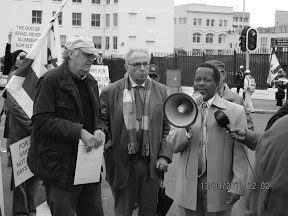The International Christian Embassy of Jerusalem (ICEJ), Bridges for Peace and the South African zionist Federation (Cape Council) recently joined forces to rally outside parliament in protest of the Durban 3 Conference and the Palestinian Unilateral Declaration of Independence.
 |
| ICEJ SA Chairman David Wilkin, SAZF Honorary Life President Adv. Jonathan Silke and Ken Meshoe of the ACDP. |
The common thread linking these two events has been the cause for much contention. Both condemn Israel for its treatment of the Palestinians and pressure her to make concessions via international support.
Initially born out of the World Conference against Racism, Racial Discrimination, Xenophobia and Related Intolerance that took place in Durban in 2001, the Durban Conference served as the ideal setting to exclusively ‘bash’ the State of Israel. It is also where the Israel-apartheid analogy was first proposed.
Both the UDI and Durban 3 served as a regurgitation of baseless accusation infused with anti-Israel rhetoric, including the Israel-apartheid analogy, Israel’s ‘diabolical’ partnership with the United States and the claim by Palestinian Authority President Mahmoud Abbas that the Palestinian people have been under brutal Israeli occupation for 63 years.
An empowering experience
The overriding objective of the rally,however optimistic, was to sway the South African government’s decision to abstain from voting in favour for Palestinian UDI and to withdraw any support for the Durban 3 Conference. The South African Jewish Board of Deputies and South African Zionist Federation have expressed their disappointment at the South African government’s stance on these issues. At the rally, parliamentarians representing the ANC and ACDP received a joint memorandum from the participating organisations, presented by ICEJ SA Chairman David Wilkin.
While the day was successful in driving the intended message and generating much-needed public awareness (with members of the media covering the story), the rally fell short in numbers — particularly with the lack of youth in attendance. This was an opportune time to heed the call and to take a stand, and those who did participate undoubtedly felt a sense of empowerment by the experience.
Collectively, the strategic media weapons employed by the Palestinian propaganda machine have amounted to nothing other than the delegitimisation of the state of Israel that only hinder the peace process. The aspirations of ordinary Palestinians to secure a state of their own has again been jeopardised by their own leadership. Pragmatic leadership on both sides of the negotiation table is of paramount importance if peace is to be achieved.
In the interim, we in the Diaspora should take note that we can play a central role in encouraging dialogue between different faiths and compelling the powers that be to act through effective initiatives.











